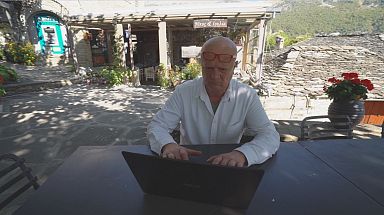Greece: from isolation to connection with the outside world thanks to the arrival of broadband in remote areas
Megalo Papigo, in the Zagori region of northern Greece's Pindos Mountains, is experiencing a silent revolution.
This small village, which until a few months ago had no connection to the digital world, now has broadband internet access, along with 5,000 other villages in remote areas of the country.
The project, which is supported by the European Union, has changed things for many people.
The impact of the arrival of broadband
"I have experienced life before and after the Internet," says Nikos Tsoumanis who has a small hotel-restaurant and grocery store there.
"Before there were many difficulties in terms of communication, customer relations, the sale of our products, and for promoting our companies. And now the speed is huge."
Like him, half a 525,287 residents have broadband in the small villages of the North, Centre and South of the country, as well as in the remote islands. An area that represents 45% of the territory of Greece.
The Zagori region is famous for rafting and hiking and the arrival of broadband has resulted in an increase in tourism,
But that’s not all.
"There has been a 30 per cent increase in tourist bookings. Secondly, our agricultural products are sold all over the world, via the Internet. Our village, our region has come out of isolation," says Mayor of Zagori, George Soukouvelos.
Closing the broadband gap in Greece
The total budget for this project is €199,715,754, out of which around €161 represents public expenditure.
Part of the project was implemented between 2007-2013 (€60 million of public expenditure) this was co-financed at 100%, according to the rules applied for Greece for that period.
The remaining part (public expenditure: € 100 million) is being implemented in the period 2014-2020 with a co-financing rate of 80% provided by the EU Cohesion Policy and the rest by public and private funds.
The financial and technological commitment which took place during the Greek recession has led to profound changes
"What we see is that a number of startups or businesses have been stabilized in these areas, and remain there without having to move their facilities to more urban areas due to this simple connection that they can use," says Antonis Tzortzakakis, the general secretary of telecommunications and posts, Ministry of Digital Governance.
A challenging journey
Two telecom companies participated in the project:
"This project it's a good example of collaboration between public and private sector. We operate now these networks for the next 15 years, and after the infrastructures will be transferred back to the State," says George Stathopoulos, the Rural Director of OTE, the largest technology company in Greece.
The OTE group has installed 12,000 kilometres of optical fibre in more than 2,000 remote villages and has provided broadband Internet in 320,000 inhabitants and now the OTE network in these areas has a penetration capacity of up to 25% and it's increasing.
For the luxury hotel, 1700 Hotel & Spa in Micro Papigo, located at an altitude of 1000 metres, fast Internet is essential to attract customers.
"The tourism and technology sectors are developing in parallel and it is very important for us, the entrepreneurs, to take a step forward to provide the best possible service," says Elsa Exarhou Kenteri, Manager of Mikro Papigo 1700 Hotel & Spa.













